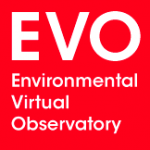UK Environmental Virtual Observatory pilot study
 How can we use the web and IT to help us understand catchments better?
How can we use the web and IT to help us understand catchments better?- How can we better predict floods and improve flood risk management?
- How can we bridge the gaps between scientific thinking, communities and effective policy?
These are all questions aiming to be tackled by The pilot Environmental Virtual Observatory (pEVO) is a Natural Environment Research Council (NERC) funded initiative. It is a proof of concept project designed to demonstrate that linking data, models and expert knowledge will provide cost effective answers to vital wide-ranging environmental issues (initially in the soil – water system).
The project vision is:
- To make environmental data, models, information and tools from public and private data assets more visible and accessible to a wide range of potential users including public good applications.
- To develop new tools to facilitate the integration of data and models for hypothesis testing and gap analysis, tools for visualisation and interpretation of results, and links to added knowledge and expert analysis.
- To provide a forum for testing and developing decision-support tools to help resource managers and policy makers to tackle environmental challenges, from local to global scales.
The work in Tarland is part of the workpackage:
Local Landscape Learning & Visualisation Tools, which set out to test the theory that:
Complex environmental issues such as diffuse pollution, flooding, water scarcity and carbon dynamics can be captured and communicated to communities in simple, informative, easy-to-use tools that empower the scientific, policy and the wider end-user communities?
The Tarland catchment is part of a set of three UK catchment studies, together these are:
- Tarland (NE Scotland)
- Eden (Cumbria)
- Dyfi (mid Wales)
For further information contact: Marc Stutter
Category: Projects







